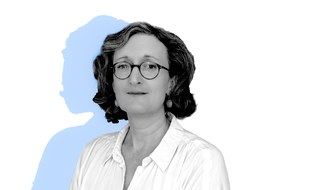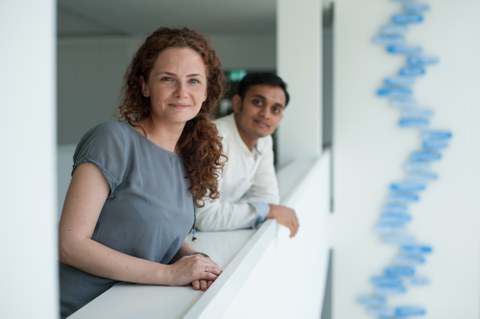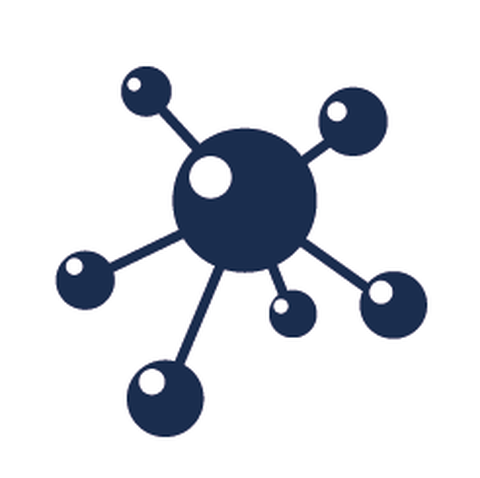TUD Young Investigators
Inhaltsverzeichnis
Ziele & Rechte
Unsere Ziele
Der Status „TUD Young Investigator“ stärkt die Position exzellenter, unabhängiger Nachwuchsgruppenleiter:innen (bspw. ERC-Starting Grant, Emmy Noether) am Wissenschaftsstandort Dresden durch eine stärkere Einbindung in die Fakultäten und das spezifisch auf sie zugeschnittene Qualifikationsangebot FAST FORWARD.
Ziel ist es, strukturell bedingten Nachteilen entgegenzuwirken, die unabhängigen Nachwuchsgruppenleiter:innen durch ihren nicht klar definierten Status und
die zum Teil mangelhafte oder komplett fehlende Anbindung an eine Fakultät zuweilen erwachsen.
Ihre Rechte
Jeder „TUD Young Investigator“
- wählt zwei Hochschullehrer:innen der TUD als Mentor:innen und direkte Ansprechpartner:innen,
- wird als Gutachter:in und Prüfer:in für Promotionsverfahren,
insbesondere bei von ihm/ihr (mit-)betreuten Dissertationen akzeptiert, - erhält die Möglichkeit, sich an der Lehre zu beteiligen,
- wird zum öffentlichen Teil der Fakultätsratssitzungen als Gast eingeladen,
- hat die Möglichkeit, am exklusiv konzipierten Qualifizierungsprogramm FAST FORWARD teilzunehmen.
Der Status wird zeitlich befristet vergeben und ist an die Dauer der Beschäftigung
als unabhängige:r Nachwuchsgruppenleiter:in gebunden bzw. endet er i. d. R. mit Weggang von der TU Dresden oder der Berufung auf eine Professur.
Informationen zum Bewerbungsprozess
Wer kann sich bewerben?
Bewerben können sich
- unabhängige Nachwuchsgruppenleiter:innen in befristeter Stellung an der TU Dresden oder einer Partnereinrichtung des DRESDEN-concept,
- mit eigener Budget- und Personalverantwortung,
- die wissenschaftlich unabhängig und ohne Angliederung an eine Professur, selbständig eine Forschergruppe mit mindestens zwei Wissenschaftlern
(exklusive des Leiters) leiten. - Neben einer abgeschlossenen Promotion mit mindestens sehr gutem Prädikat (magna cum laude) werden habilitationsadäquate Leistungen erwartet.1
Wie läuft der Bewerbungsprozess ab?
Die Antragstellung auf Verleihung des Status TUD Young Investigator beim Rektorat
setzt Folgendes voraus:
- die Zustimmung der jeweiligen Fakultät sowie
- die Zusage eines Professors/einer Professorin der Fakultät, als Mentor:in zu agieren.
Interessierte Kandidat:innen wenden sich daher bitte zuerst an die gewünschte Fakultät bzw. den/die Dekan:in, um zu prüfen, ob die Fakultät bereit ist, sie als TUD Young Investigator aufzunehmen.
Anbindung an zwei Fakultäten
Eine interdisziplinäre Anbindung an zwei Fakultäten ist grundsätzlich möglich. In diesem Fall müssen beide Fakultäten den Antrag unterstützen und jeweils eine Vereinbarung mit dem TUD Young Investigator abschließen.
- Die Einbindung in die Lehre sollte auch in diesem Fall den Umfang von insgesamt zwei SWS nicht überschreiten.
- Die wissenschaftliche Qualifizierung und Profilierung des TUD Young Investigators sollen dabei immer im Vordergrund stehen und nicht beeinträchtigt werden.
- Individuelle Absprachen zwischen den Fakultäten und dem TUD Young Investigator sind möglich und ausdrücklich erwünscht.
Nach Prüfung des Antrags und der Abstimmung im Fakultätsrat leitet die Fakultät alle Unterlagen (Antrag und Vereinbarung) sowie die schriftliche Stellungnahme der Fakultät an die Prorektorin Forschung und Graduiertenakademie weiter.
Der TUD Young Investigator Status wird zeitlich befristet vergeben.
Er ist an die Dauer der Beschäftigung als unabhängige:r Nachwuchsgruppenleiter:in gebunden oder endet automatisch mit dem Weggang von der TU Dresden bzw. der Berufung auf eine Professur.
Eine Verlängerung um (maximal) ein weiteres Jahr über die Laufzeit der Nachwuchs- gruppe hinaus ist nur mit Zustimmung und auf schriftlichen Antrag der Fakultät möglich.
Antrag auf Verlängerung des TUD Young Investigator Status (Download)
Interessent:innen wenden sich für die Antragsformulare bitte an die Graduiertenakademie.
FAST FORWARD | Qualifizierungsprogramm
Das exklusive Weiterbildungsprogramm FAST FORWARD ist explizit auf die Bedürfnisse
von Wissenschaftler:innen in dieser Qualifikationsphase ausgelegt.
Good Scientific Practice in Doctoral Supervision | 3 Online-Module
- Montag, 26. Januar 2026 | 13:00 – 17:30 Uhr
From the research process to its product: documenting the research process and managing data - Montag, 23. Februar 2026 | 9:30 Uhr - 12:30 Uhr
From the research process to its product: publishing, contributing, and accountability - Montag, 9. März 2026 | 13:00 - 17:30 Uhr
Misconduct in research and how to deal with it
Doctoral Supervision | Online (en)
- Donnerstag, 19. März 2026 | 14:00 - 17:00 Uhr
- Donnerstag, 26. März 2026 | 09:30 - 12:30 Uhr
*Kurzfristige Änderungen vorbehalten
Diese Workshops werden jährlich/wiederholt angeboten:
- Berufungstraining
- Gute Promotionsbetreuung
- Gute wissenschaftliche Praxis
- Power Games and Micropolitical Competence in Academia
Weitere bisher angebotene Workshops:
- Fachkompetenz ist (fast) alles –
Kluge Selbstvermarktung, ein unverzichtbares Supplement - Leadership in der Wissenschaft: Teams führen & Promovierende betreuen
- Leadership in der Wissenschaft: Teams stimmig führen
- Power Games and Micropolitical Competence in Academia
- Research-oriented Learning and Teaching
- Interdisciplinary Idea Development in the World of Projects
- Status Communication in Academia
-
Growing into Leading a Research Group | Online
Netzwerkveranstaltungen
Neben den Workshops bieten verschiedene Veranstaltungsformate eine hervorragende Möglichkeit, das eigene wissenschaftliche Netzwerk strategisch und interdisziplinär zu erweitern und sich mit anderen Nachwuchsgruppenleiter:innen auszutauschen.
- Mensa Meet Up
- Stammtisch
- Sommerfest der Graduiertenakademie
TUD Young Investigator im Überblick
Bereich Mathematik und Naturwissenschaften
DR. MARKO BRANKATSCHK
Technische Universität Dresden | Biotechnologisches Zentrum (BIOTEC)
...........................................................................
Die Fakultät Biologie ist eine von fünf Fakultäten des Bereiches Mathematik und Naturwissenschaften der TU Dresden.
Sie beheimatet die vier Institute Botanik, Genetik, Mikrobiologie und Zoologie mit insgesamt 13 Professuren.
DR. RICO FRIEDRICH
Technische Universität Dresden
PD DR. TOBIAS A. F. KÖNIG
Leibniz-Institut für Polymerforschung Dresden e. V.
DR. ELISHA KRIEG
Leibniz-Institut für Polymerforschung Dresden e. V.
DR. FABIAN PAULUS
Leibniz-Institut für Festkörper- und Werkstoffforschung Dresden
DR. NATALIA MAYORDOMO HERRANZ
Helmholtz-Zentrum Dresden-Rossendorf
DR. CHRISTIAN ROßNER
Leibniz-Institut für Polymerforschung Dresden e.V.
DR. ETERI SVANIDZE
Max-Planck-Institut für chemische Physik fester Stoffe
DR. MINGHAO YU
Technische Universität Dresden
..........................................................................
Die Fakultät Chemie und Lebensmittelchemie ist eine von fünf Fakultäten des Bereichs Mathematik und Naturwissenschaften.
Sie umfasst sieben Fachgebiete mit 23 Professuren.
DR. ALIAKSEI CHARNUKHA
Leibniz-Institut für Festkörper- und Werkstoffforschung (IFW)
DR. CLAIRE DONNELLY
Max-Planck-Institut für Chemische Physik fester Stoffe
DR. OLEG JANSON
Leibniz-Institut für Festkörper- und Werkstoffforschung (IFW)
DR. LUKAS JANSSEN
Technische Universität Dresden
DR. HANS KLEEMANN
Technische Universität Dresden
DR. URI VOOL
Max-Planck-Institut für Chemische Physik fester Stoffe
..........................................................................
Die Fakultät Physik profitiert von breiter internationaler Zusammenarbeit und einer einmaligen Vielzahl lokaler außeruniversitärer Partnereinrichtungen im Rahmen des DRESDEN-concepts.Schwerpunkte der experimentellen und theoretischen Forschung liegen in den Bereichen Festkörperphysik, Kern- und Teilchenphysik, komplexen Quantensystemen und Biophysik.
Aktuell gibt es an dieser Fakultät keinen TUD Young Investigator.
..........................................................................
Die Fakultät Psychologie versteht sich als empirische Humanwissenschaft mit einer naturwissenschaftlich-experimentellen Ausrichtung.
Eine hervorragende Forschungsinfrastruktur und international renommierte Arbeitsgruppen, dem wissenschaftlichen Nachwuchs beste Startvoraussetzungen.
Die Fakultät Psychologie unterhält zahlreiche Kooperationen mit anderen Disziplinen (z.B. der Neurowissenschaft, der Psychiatrie, der Genetik, der Arbeitswissenschaft, der Wirtschaftswissenschaft, der Erziehungswissenschaft, der Informatik und der Philosophie).
DR. TÜRKÜ ÖZLUM ÇELİK
DR. AIDA MARAJ
..........................................................................
Die Fakultät Mathematik ist mit 27 Professorinnen und Professoren eine der größten mathematischen Fachrichtungen in Deutschland. Sie ist gekennzeichnet durch ein breites Forschungsspektrum, mit mehreren ERC-grants, DFG-Projekten und Beteiligungen an Exzellenzclustern, Sonderforschungs-bereichen und Graduiertenkollegs.
Sie ist damit zentraler Bestandteil verschiedener Forschungsprofillinien der TU Dresden und verbindendes Glied zahlreicher interdisziplinärer Projekte.
Bereich Ingenieurwissenschaften
DR. SARAH GAGGL
Technische Universität Dresden | International Center for Computational Logic
...........................................................................
Die Fakultät Informatik gehört zu den größten Ausbildungsstätten für Informatik in Deutschland.
Es gibt 12 verschiedene Studiengänge, die mit Bachelor, Master, Diplom (inzwischen eine Besonderheit in Deutschland) oder dem Staatsexamen abgeschlossen werden können. Internationale Masterprogramme und mehrere strukturierte Doktorandenprogramme.
DR. SASCHA HEITKAM
Technische Universität Dresden | Helmholtz-Zentrum Dresden-Rossendorf (HZDR)
DR. IGOR ZLOTNIKOV
Technische Universität Dresden | B CUBE – Center for Molecular Bioengineering
..........................................................................
Seit über 180 Jahren steht die Fakultät Maschinenwesen mit Forschung und Lehre im Dienst der Technik für den Menschen. Mit fast 4.900 Studierenden ist sie die größte Fakultät an der TU Dresden.
Der allgemeine Maschinenbau, Leichtbau, Luft- und Raumfahrt, Bioverfahrenstechnik oder Lebensmitteltechnik sind nur einige der angebotenen Studienrichtungen, aus denen je nach Studiengang gewählt werden kann.
DR.-ING. E.-F. MARKUS VORRATH (NÉE HENKE)
..........................................................................
Mit 29 Professuren und einer Juniorprofessur zählt die Fakultät Elektrotechnik und Informationstechnik mit ihrem Leitspruch „Denken in Systemen“ zu den großen Fakultäten an der TU Dresden. Die Angebote in Lehre und Forschung sind entsprechend vielfältig.
Die Fakultät ist nicht nur mit internationalen Hochschulen und Forschungseinrichtungen, sondern auch mit der Industrie hervorragend vernetzt.
Bereich Bau und Umwelt
Aktuell gibt es an dieser Fakultät keine TUD Young Investigator .
.................................................................................................................................................
Die Fakultät Architektur vereint die Fächer Architektur und Landschafts-architektur. Das kommt innerhalb Deutschlands nur selten vor.
In Dresden hat es gute Tradition und
prägt das Profil der Fakultät ebenso wie eine stark entwurfsorientierte Ausrichtung der Ausbildung. Die Ausgewogenheit der theoretischen, künstlerischen, technischen und ökologischen Aspekte des Gestaltens der Umwelt ist Basis der Arbeit an der Fakultät.
Aktuell gibt es an dieser Fakultät keine TUD Young Investigator.
..........................................................................
Die Fakultät Bauingenieurwesen bietet ihren etwa 1.800 Studentinnen und Studenten in sechs Vertiefungen eine solide und exzellente Ausbildung.
An elf Instituten forschen und lehren 19 Professoren und über 150 wissenschaftliche Mitarbeiter:innen.
PROF. DR. MARTINA ARTMANN
Forschungsprofessur Grüne Infrastruktur | Hochschule Weihenstephan-Triesdorf
& Leibniz-Junior Research Group: Urbane Mensch-Natur Resonanz für eine Nachhaltigkeitstransformation | IÖR
DR. MARTA MARKIEWICZ
Technische Universität Dresden
.................................................................................................................................................
Die Fakultät Umweltwissenschaften vereinigt – bundesweit einmalig – die drei umweltbezogenen Wissenschaftsfelder Forstwissenschaften, Geowissenschaften und Hydrowissenschaften unter einem Dach. Die interdisziplinäre und internationale Ausrichtung schafft große Synergiepotenziale.
Aktuell gibt es an dieser Fakultät keine TUD Young Investigator.
..........................................................................
Mehr als 200 Wissenschaftler:innen forschen und lehren an sieben Instituten und mehr als 20 Professuren der Fakultät Verkehrswissenschaften.
Die Fakultät bietet sechs eigene Studiengänge an, darunter der Diplomstudiengang Verkehrsingenieur-wesen, das Bachelorstudium Verkehrswirtschaft sowie vier Masterstudiengänge.
Aktuell gibt es an dieser Fakultät keine TUD Young Investigator.
...........................................................................
Das Studienangebot der Fakultät Wirtschaftswissenschaften ist breit gefächert. Studierende können zwischen zwei Bachelorstudiengängen (Wirtschaftswissenschaften, Wirtschaftspädagogik), zwei Diplomstudiengängen (Wirtschaftsingenieurwesen, Wirtschaftsinformatik) und drei Masterstudiengängen (BWL, VWL, Wirtschaftspädagogik) wählen.
Bereich Medizin
DR. HAYDER AMIN
Deutsches Zentrum für Neurodegenerative Erkrankungen (DZNE)
DR. DARJA ANDREEV
Technische Universität Dresden | Zentrum für Regenerative Therapien Dresden (CRTD)
DR. JIRI EITLER
Technische Universität Dresden
DR. ANKE FUCHS
Technische Universität Dresden | Zentrum für Regenerative Therapien Dresden (CRTD)
DR. NATALIA RODRIGUEZ-MUELA
Deutsches Zentrum für Neurodegenerative Erkrankungen (DZNE)
DR. JAMES PETER SÁENZ
Technische Universität Dresden | B CUBE – Center for Molecular Bioengineering
DR. TATIANA SANDOVAL GUZMÁN
Technische Universität Dresden | Zentrum für Regenerative Therapien Dresden (CRTD)
DR. ANNA TAUBENBERGER
Technische Universität Dresden | Biotechnologisches Zentrum (BIOTEC)
..........................................................................
Der Bereich Medizin der TU Dresden besteht aus der leistungsstarken Medizinischen Fakultät Carl Gustav Carus.
Ihre innovative, patientennahe Lehre und die international sichtbare Spitzenforschung kann die Fakultät nur durch die enge Kooperation mit dem Universitätsklinikum Carl Gustav Carus realisieren.
Das hervorragende wissenschaftliche Umfeld in Dresden und die zahlreichen internationalen Kooperationen sind weitere wesentliche Faktoren für die positive Entwicklung der Dresdner Hochschulmedizin.
Bereich Geistes- und Sozialwissenschaften
...........................................................................
Die Fakultät Erziehungswissenschaften ist das akademische Dach für Studium, Lehre und Forschung der gesamten Breite der Erziehungswissenschaften.
Gemessen an der Zahl unserer Studierenden und Neuimmatrikulierten gehört die Fakultät Erziehungs-wissenschaften zu den größten Einrichtungen der TU Dresden.
Dr. Manès Weisskircher
Institut für Politikwissenschaft | TU Dresden
...........................................................................
Die Philosophische Fakultät wird durch ein breit gefächertes Angebot aus geistes- und sozialwissenschaftlichen Fächern geprägt, das eine multiperspektivische, methodisch vielfältige und gesellschaftlich hochrelevante Lehre und Forschung bietet.
Die Fakultät ist zugleich international vernetzt und fest im sozialen und kulturellen Leben der Kulturhauptstadt Dresden verankert.
Aktuell gibt es an dieser Fakultät keine TUD Young Investigator.
...........................................................................
Die Fakultät Sprach-, Literatur- und Kulturwissenschaften der TU Dresden wurde 1993 gegründet. Sie umfasst derzeit 23 Professuren (inkl. Vertretungen). Unter Einbeziehung des Lehrzentrums Sprachen und Kulturen sowie des Mitteleuropa-zentrums sind an der Fakultät im Mittel 190 wissenschaftliche Mitarbeiter beschäftigt.Aktuell sind mehr als 4000 Studierende in den Studiengängen der Fakultät eingeschrieben.
Ehemalige TUD Young Investigator
- PROF. DR. MAREIKE ALBERT
Zentrum für Regenerative Therapien Dresden (CRTD) | Technische Universität Dresden - PROF. DR. SIMON ALBERTI
Professur für Biochemie | Technische Universität Dresden - PROF. DR. MARTINA ARTMANN
Forschungsprofessur Grüne Infrastruktur | Hochschule Weihenstephan-Triesdorf
& Leibniz-Junior Research Group: Urbane Mensch-Natur Resonanz für eine Nachhaltigkeitstransformation | IÖR - DR. CHRISTIAN BÖKEL
Universität Ulm - PROF. DR. LARS BORCHARDT
Professur für anorganische Chemie | Ruhr-Universität Bochum - PROF. DR. VOLKER BUSSKAMP
Professur für degenerative Netzhauterkrankungen | Universität Bonn
-
PROF. PhD. Eng. CARLO V. CANNISTRACI
Department of Biomedical Engineering | Tsinghua University, Beijing, China
- PROF. DR. ÜNAL COSKUN
Paul-Langerhans-Institut Dresden (PLID) | Technische Universität Dresden - PROF. DR. ERIKA COVI
Cognitive Systems and Materials Center | Universität Groningen - PROF. DR. ILONA CROY
Lehrstuhl für Klinische Psychologie | Friedrich-Schiller-Universität Jena
-
Fakultät für Chemie | Universität Hongkong
-
PROF. DR. ANDRÉ ECKARDT
Professur für Physik | Technische Universität Berlin -
JUN.-PROF. DR.-ING. ANETTE ELTNER
Juniorprofessur für Geosensorsystem | Technische Universität Dresden -
DR. KATERINA FALK
Projektmanager | Infineon R&D -
PROF. DR. ELISABETH FISCHER-FRIEDRICH
Technische Universität Dresden | Exzellenzcluster Physics of Life (PoL) - PROF. DR. BENJAMIN FRIEDRICH
Heisenberg-Professur für biologische Algorithmen
Exzellenzcluster Physics of Life | Technische Universität Dresden - DR. ION COSMA FULGA
Leibniz-Institut für Festkörper- und Werkstoffforschung (IFW) - PROF. DR. ELENA GATI
Max-Planck-Institut für Chemische Physik fester Stoffe | TUD Honorarprofessur - PROF. DR. INGMAR GLAUCHE
Institut für Medizinische Informatik und Biometrie | Technische Universität Dresden - PROF. DR. DOROTHEA GOLZE
Professur für Theoretische Chemie | Universität Würzburg - PROF. DR. JOHANNES GOOTH
Senior Data Scientist | Tchibo
Rheinische Friedrich-Wilhelms-Universität Bonn (bis 2024) - PROF. DR. MICHAEL HILLER
LOEWE-Zentrum für Translationale Biodiversitätsgenomik (LOEWE-TBG) - DR. CASPAR HOPFMANN
Deutsche Telekom Chair of Communication Networks | TUD - DR. FLORIAN JUG
Head of Image Analysis Facility | Fondazione Human Technopole (Mailand) - PROF. DR. DOMINIK KRAUS
Professur für Hochenergiedichtephysik | Universität Rostock - PROF. DR. MARKUS KRÖTZSCH
Professur für wissensbasierte Systeme | Technische Universität Dresden
-
PROF. DR. JAKUB LIMANOWSKI
Biologische Psychologie | Universität Greifswald -
PROF. DR. FRANZISKA LISSL
Angewandte Polymerphysik | TH Hamburg -
PROF. DR. AXEL LUBK
CEOS-Stiftungsprofessur für Elektronenoptik | TU Dresden, IFW Dresden -
DR. JÖRG MANSFELD
Institute of Cancer Research (ICR) in London, UK -
PROF. DR. MARIANA MEDINA SÁNCHEZ
Ikerbasque Research Professor und Gruppenleiterin | CIC nanoGUNE | Spanien -
DR. TOBIAS MENG
Teamleiter in der Forschung im Bereich Quantentechnologie | JoS QUANTUM - JUN.-PROF. SANDER MÜNSTER
Juniorprofessur für Digital Humanities | Friedrich-Schiller-Universität Jena - PROF. DR. CAROLINE MURAWSKI
Professur für biomedizinische Sensorik | TU Dresden - DR. SOLVEJG NITZKE
Allgemeine und Vergleichende Literaturwissenschaft | Ruhr-Universität Bochum - PROF. DR. FRANK ORTMANN
Theoretische Methoden in der Spektroskopie | Technische Universität München - PROF. DR. MAREIN RAHN
Professur Experimentalphysik | Universität Augsburg - PROF. DR. MARCO SALVALAGLIO
Professorship (apl) of Computational Materials Science | TUD - PROF. DR. FRANK SIEGERT
Professur für Teilchenphysik und deren Simulation | TUD
- PROF. DR. CHRISTINA SCHEFFLER
Professur Polymere im Bauwesen an der Technischen Universität Dresden und
Leibniz-Institut für Polymerforschung Dresden (IPF) - PROF. DR. MICHAEL SCHLIERF
Professur für molekulare Biophysik | Technische Universität Dresden - PROF. DR. THORSTEN-LARS SCHMIDT
Assistant Professor for Experimental Biophysics | Kent State University (USA)
-
DR. ANDREAS SCHNEEMANN
ENS Paris (ab 03/26) -
DR. HELMUT SCHULTHEISS
Helmholtz-Zentrum Dresden-Rossendorf (HZDR) -
PROF. DR. ABHINAV SHARMA
Professur Theoretische Physik, Universität Augsburg
Leibniz-Institut für Polymerforschung Dresden (IPF) -
PROF. DR. JULIANE SIMMCHEN
Reader | Pure and Applied Chemistry | University of Strathclyde, Glasgow (GB) - PROF. DR. STEPHAN SPEIER
Professur für Physiologie pankreatischer Inselzellen
Technische Universität Dresden - DR. CATALIN STEFAN
Technische Universität Dresden - PROF. DR. JULIAN THIELE
Organische Chemie | Otto-von-Guericke-Universität Magdeburg - DR. MAXIMINA YUN
CIMR-Chinese Institutes for Medical Research | Beijing | China - Dr. CHRISTOPH ZECHNER
Stochastic processes in cells and tissues
Scuola Internazionale Superiore di Studi Avanzati | Trieste, Italien - PROF. DR. MARCO ZIMMERLING
Networked Embedded Systems | Albert-Ludwigs-Universität Freiburg
Ihre Ansprechpartnerin
 © Claudia Wittmann
© Claudia Wittmann
Stellvertretende Sachgebietsleiterin
NameAngela Böhm M.A.
Referentin Karriereentwicklung, TUD Young Investigator, ÖA
Eine verschlüsselte E-Mail über das SecureMail-Portal versenden (nur für TUD-externe Personen).
Besuchsadresse:
Graduiertenakademie Mommsenstraße 7
01069 Dresden
Sprechzeiten:
Termine nach Vereinbarung
Fußnoten
-
Habilitationsadäquate Leistungen sind die Qualität und Anzahl der Publikationen, dokumentierte Lehrqualität, Mentoring von Nachwuchs und Drittmittelerfolg.
Die Kriterien sind je nach Fächerkultur unterschiedlich definiert und gewichtet.
Ob diese vorliegen, darüber entscheidet die jeweilige Fakultät.








